- Home
- Jason McIntyre
Thalo Blue Page 3
Thalo Blue Read online
Page 3
Only part of one arm was visible now, in the corner of his sight. The hand holding the weapon to his jawbone quivered, wavered, but did not lower and the other hand, the one holding him by the throat, had rescinded its grip as well. He was now face to face with his bedroom door and two uniformed officers, weapons drawn and looking like they had always been there. We get used to things, his drifting mind spurted at him. His mind was adrift and the words were tied to a rope, floating in the sky of his dimming thoughts: be damned if we can’t get used to any ol’ thing.
One of the stranger’s hands was behind Sebastion’s shoulder and his throat was caught in a gagging gesture by the tight crook of the intruder’s right arm. His feet were nearly dangling below him and the skin on the visible arm was bronze, specked with darker spots. He could smell sweat and something coppery: blood. Reacting, his hands went immediately to clutching and gnawing at the dark-skinned forearm squeezed against his Adam’s apple; his eyes squinted and fought back more tears.
Sebastion was the outlaw at the end of a spaghetti western, dangling and flailing sloppily, grabbing at the noose around his neck. He clumsily gripped this arm, this foreign object, and strained to block out an onslaught of bursting lights at the corners of his vision. The bedroom was swallowed by that sharp orange, a sick dead color, and the translucent glaze was punctuated by white flares and shots of what looked like spiraling sinew. His consciousness began to run away from him. He was choking and everything under the orange was hazy. The boundaries of definite shapes began to fuzz out and the voices of the officers were gone. Simply gone. He saw their eyes in tight slits, faces snarled in yells, mouths opening and closing, but he couldn’t hear a word. The distance from his face to theirs seemed interminable. It would be a year-long voyage across ocean waters to reach the words that came from their lips now. Up, up, towards the ceiling the silent words went, gone, never really existing, floating now, somewhere above their heads. In his mind, only nothingness, only coming blindness, and that terrible thrumming of blood behind his ears.
In an instant, Sebastion’s body weight was forced to shift by the man holding him firmly from behind. In the shallow light of the bedside lamp, near a tan telephone handset that still sat wobbling on the carpet, the two of them tilted forward and to one side. He was helpless to struggle against it, couldn’t, wouldn’t try. The air in his lungs was trapped, and the edges of what he saw were questionable. Did the world even have edges anymore? And did it matter if it didn’t? A loud pop came, then another, breaking the silence inside Sebastion. No, came the answer to his questions, both of them. The world didn’t have edges. And edges didn’t matter. Be damned if we can’t get used to any ol’ thing. Fade Away Divine. Still tryin’ Purple Lion. Just make it stop. Pleaseohpleaseohplease just make it stop. Both bodies, his and the enormous one that contained him, felt the jolt. It tore through them, and they teetered backward—
(Just make it stop)
—Backward over the brink.
<><><>
In the bathroom, sitting in its cold puddle of stray tub water, the glass tumbler existed undisturbed. But the two cubes of ice within shifted inexplicably, as ice cubes will do for some reason. They collided together, with a set of small clinks, then eased further down inside the glass. They settled on an angle, points pushing against the base of the glass, points pushing against one another. The tiny measure of heat generated by their movement caused them each to begin melting into the other and they became one chunk of ice with two arms.
II. The Default Color for Pain
A crow used to visit Sebastion by his bedroom window, used to perch on a bare tree branch where the boy could see it as he lay in bed, under his blue bedspread. Black and shiny, it would cock its head this way and that, and it would stay there for a while, as Sebastion looked on. When he was younger, he would speak to it, “CawCAWCawCAW—C—A—W—Caw.” But as he grew older, he just lay in silence and watched it. Inevitably, as he became tired and as his eyes sagged with the day’s fatigue, the crow would flutter away, suddenly and without warning, leaving a dark branch to bob slightly against a backdrop of night. He named that bird, called it Oliver.
<><><>
The year that Sebastion came into the world was a terrible, hideous and difficult one for his parents when tragedy after tragedy seemed to occur. They had been married for only a year: Sadie Nadine, his mom, and Oliver Warren, his dad. Amid a flapping storm of controversy which he called unsubstantiated, Oliver was let go from a major financial firm and with the papers for the house already signed, income became the holiest of grails in the Redfield home. With money on his mind, his first reaction to Sadie’s impending motherhood was one of apprehension, disgust even. He had not planned for this.
That same year, Samuel McArthur, Sadie’s dad, finally lost his battle with the bottle. His wife, Beatrice, had found Pop Sammy in the barn of their pig farm north of Edan, in a bale of hay. He had collapsed, had fallen from the loft and smashed a bottle of scotch across his forehead. But it wasn’t the fall that killed him, though it had surely helped. No, he had been drinking since the early part of the sixties and his liver was a black dead spot next to his stomach. The poison had stretched to his furthest extremities. And though he had gone to see the doctor on numerous occasions and had been diagnosed properly, he refused hospitalization. His stubbornness left him a pale, yellowed corpse with chaff pasted to his drawn face by the same sticky alcohol that would have been on his last breath.
Beatrice had stumbled across her husband while their breakfast of ham and eggs sizzled in a fry pan on the stove top. Bereft, grief-stricken and lost, she downed a handful of iron pills later that morning from a bottle over the bathroom sink and chased that with thirty or so pills of Doxepan—a more powerful ancestor of Prozac. She was dead in an hour. A boy who delivered groceries to the McArthur farm discovered them, her in an open bathrobe laying half-nude near the toilet in a puddle of vomit, and he out in a pile of hay in the barn as the pigs snuffled and scuttled about. The news found its way to the tan telephone with gray buttons on the kitchen wall of the Redfield house in Vaughan. This was the very same day that Sadie had come home from the doctor to tell Oliver she was expecting.
Earlier in the year, Sicily, Sadie’s younger sister, had run away from the farm. When he drank, Pop Sammy used to hit them both, Beatrice too. Hearing that her sister had left, Sadie guessed that he was still in the habit of taking out his fists if the spirit moved him. Sadie had gone off to school a few years before, had left Pop Sammy and her mother comfortably hidden in her personal rearview mirror. She had gotten work and had found the promise of security and a future with Oliver Redfield, was even on her way to completing the last year of her Education degree. Sicily, though, she couldn’t make a go of it on her own. Not in the city, not without a diploma or some cash to start with. Unlike Sadie who had found her stand-up man with his career on the rise, Sicily died young—at the age of nineteen—in a hotel room on Darcel Avenue. She had been beaten to death by a strung out john who didn’t like how she gave a blowjob.
The day that Sebastion was born, a Sunday, the sky was a sheet of electric blue and there wasn’t a single cloud to mar it, no sign that heaven even existed. Oliver received word on that day that his brother, Martin, a tax attorney, and his wife Bette, twelve years younger than Martin, had died in a house fire the previous night. The neighbors told police they had found Bette’s and Martin’s seventeen-year old daughter, Carol-Anne, in her bare feet and nightgown. She was holding a carving knife, stalking the front lawn, and screaming at the house while flames engulfed it from the front study. Written and verbal statements from witnesses all confirmed that the words she was yelling were similar to, if not exactly, “Burn, daddy. You like it hot too, don’t you?” The neighbors also claimed, separately, yet collectively, that they were helpless to stop when Carol-Anne drove the carving knife she was holding into her own throat. Police and medical attention arrived but too late to save her; she bled to death both on the lawn and on the floor of
the ambulance as it tore toward North York Hospital’s emergency room. The parents’ bodies were found in the doused home next morning, mom upstairs in bed, dad at his desk in the study, both with dented skulls, apparently caused by one of the girl’s merit plaques. It was a heavy brute, that plaque, gold engraving plate fastened to a marble slab a little larger than the size of two fists together, awarded for highest grade-point in her district. She would have gone to McGill with that hunk of marble, full scholarship, no doubt.
Also that delicate year, Oliver’s and Martin’s own parents, Rita, seventeen years younger than her husband, and Theodore had been involved in yet another tragic event. Local police had accused Teddy, a public rentalsman judge of some notoriety, of enjoying the company and services of young Thai girls shipped and sold to local whorehouses. Apparently reeling from the press coverage and impending court date, he took his wife, a bottle of ‘72 Cabernet from northern Italy, and their new BMW 635 out for a spin on rain slicked roads. Hours later, it was found split nearly in two, the remains wrapped tightly around a light standard by exit ramp thirty-three of Heritage Highway South. Teddy and Rita both lay dead.
Theodore Redfield, Big Teddy to his friends and his colleagues at Justice, had always told his sons three things about how to achieve a decent level of success: Always drive a Beemer. A fine tie makes the suit, makes the man. And get yourself a trophy wife.
Sadie and Oliver Redfield, now both orphans, became two only children left to raise another only child.
<><><>
Sebastion, to this day, has a set of three distinct images which he can call to mind with perfect clearness, as though they were still photos taken with Oliver’s SLR camera, ones that he could hold in his hands and stare at. These snapshots, all from his early childhood, those years between three and nine when it seemed his father’s displeasure for him began—though there are countless other snapshots with varying degrees of lesser quality—stand out to him as particularly significant. They are the clearest in his mind, and at times, he has to convince himself that they are not real, not actually happening to him at that precise moment. They are that vivid.
In order of their occurrence, the first such flashcard is of his head held down by a large white mitten while descending into a long gray tunnel. The second is a kitchen table covered in crayon markings—blue letters, z mostly, which he always pronounced zee, and his father always corrected him, zed. Combined with that memory is a long and curving line of red, starting to blister and bubble along the length of his inner forearm. The pain of it and the picture in his head of crayon markings on the kitchen table, come to him with pinprick lucidity, and they bring back the physical pain of that moment with utter perfection. He swears, when he sees that table and those crayon smears, that he can feel the unbearable itchy burning sting under the skin of his arm.
The last memory, the least clear and most perplexing of the set, is a vision of water beyond the black steel bars of a gate that stands closed before him. Looking beyond, Sebastion sees, frozen forever in his mind’s eye, a boat kicking up white furls of wake and moving towards the farthest edge of the water’s body. A man stands on the back deck of the craft facing him, his arm raised, his expression flat and empty.
<><><>
When Sebastion was four, he was diagnosed with a rather unique condition. Though to say diagnosed like that might make it seem that Sebastion would be dying. After a long and inevitable period of suffering, he would fade away and expire at an early age, with his mother and dad outliving him in a way most parents dread. Or, to say it like that, diagnosed, would be to suggest a long life of endless suffering, of daily injections or painful treatments, and in the end, that he would never be a normal kid with a normal life.
But that wasn’t the case. None of it. Except perhaps the part about normalcy.
Sebastion’s condition was, as he saw it, and as his mother always told him, rather the opposite of both the early-death and the long-drawn-out-suffering kinds of conditions. This condition was, according to Sadie, a blessing from God.
<><><>
Sadie stood in the kitchen-half of the kitchen-dining room split while soup steamed on the top of the stove behind her. She was making lunch while Oliver sat at the giant oak desk in the back study and ran through the family bills. Her husband’s head, Sadie thought, hung like it was broken when she had peered in on him and asked what would be suitable for lunch. He looked like the numbers would never settle out properly. But she didn’t say anything about the stack of papers he was staring at, had started not to and would only get less and less apt to do so.
The Redfield home, save for the cottage on scattered summer weekends, was the only home they ever lived in together as a family configuration. It was the root of nearly every one of Sebastion’s childhood memories. It was one of those ‘modern’ homes built in the nineteen-sixties when designers started to realize just how much time was spent in the kitchen, and what a social event food preparation had become. Dinner gatherings with friends and neighbors were catching on, as were fondue parties where everyone wanted to have a look in the kitchen to see what was cooking on the stove top. Certainly that’s what architects must have decided, must have told each other in weekly meetings of the time. But in reality, behind all that nonsense, was the women’s movement that wanted to pull wives out from behind the closed door of the kitchen and bring them closer to a sense of belonging, closer to a sense of equality—closer, it would seem, to their husbands at the dining table. While still a subconscious attribute of the movement, the kitchen and dining split found its way into homes of the time just the same. As such, the Redfield house had a counter dividing the kitchen and the semi-formal dining room. Above that, cupboard space which divided the room even further, but it still allowed her to peek between the above set of closed doors and the faux marbled counter top below to check on Sebastion at the table.
He was there now, with his back to her, sitting on his knees on the wooden chair, scribbling contentedly on a writing tablet with crayons. And humming, he was always humming.
Between soup-stirrings and bread-butterings, she wiped her hands on a tea towel and came around the counter to see what Sebastion was drawing. He was always, she noticed quite early, satisfied to let whatever he was doing absorb him completely. He would fall nearly silent, except for the humming, but would never be upset at being alone. Even for hours, he would sit and play or color with his crayons and never raise a fuss. She couldn’t remember the last time he had cried at anything.
She admired this quality and strove to think of instances when she had done that herself in childhood. Her memories of home, though, never went earlier than the age of six, and most after that were unhappy ones, so she usually shut them out of her mind. She did so again as she wiped her hands dry on the towel, and tilted her head at Sebastion’s drawing. It was a picture of a person: blue head, green body, and purple legs, highly articulate for such an early age, she guessed. Above the blue head of the figure were several scribbles that looked vaguely like words. Could little boys as young as Sebastion be expected to write whole words already? She didn’t think so, but dismissed the idea. The words were there, and that’s all that mattered. The first incarnation of letters seemed to say Seb, at least that’s what it looked like. The second said the same thing, but a little more clearly. The S was drawn in orange crayon, the e in green, and the b in purple. Below that conglomeration was a variation; the S had been sloppily transposed. It was a mirror image, almost like a Z. The e and the b were the same colors as above but the Z was drawn with a bright blue crayon instead of orange.
Sadie had been reading to Sebastion for months, every night a little from books like Puss In Boots and Alice In Wonderland. He seemed to enjoy the reading and Oliver insisted that their son become well rounded as early as possible. She had even started, briefly, ever so briefly, to point out letters on the pages and say their names to him. He seemed disinterested so her own desire had waned. But last night they didn’t read.
Didn’t color together either. Instead she worked on his baby book, a blue covered scrap book with giant pages where photos of baby’s first words and measurements were pasted and scrawled for each year of his life. It was sprawled on the bedspread in the master bedroom amongst loose snapshots and scraps of paper. She lay there on her stomach like a high school girl doing homework, transcribing from the scraps into the little spaces of the fourth page things like Sebastion’s weight in pounds while Sebastion played with a police car toy at the foot of the bed. Sadie loved the idea of this book and wished her own mother had made one for her to look back on. It was a document to the living of life.
Sadie supposed that Sebastion’s scrawls in crayon on the writing tablet had something to do with the two of them working on the scrap book last night. She had lifted him up to the bed and helped to steady his little hand with hers while it held a crayon and tried to write his name. Write your name, Sebastion, she had said. Write it just like this one, she had told him as she pointed to her own fancy print of his name at the top of page four. It came out like a scribble, unrecognizable really. And she had expected nothing more. But he stared at it, then at hers several times before apparently losing interest and going back to his police car. But these, here on the tablet the next afternoon, were remarkably close to real letters. To her, they looked like the doodles of a six year-old and not a four year old. But, she caught herself, isn’t it always a mother’s prerogative to think her child is the absolute smartest?
“What are you drawing, sweetie?” She asked him as she stood over him at the oak table in the dining room.

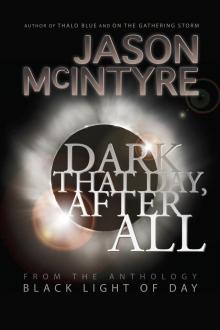 Dark That Day, After All
Dark That Day, After All Dread
Dread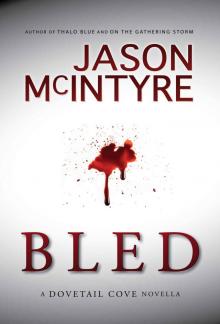 Bled
Bled Instead
Instead Fled
Fled Fled (Dovetail Cove, 1973) (Dovetail Cove Series)
Fled (Dovetail Cove, 1973) (Dovetail Cove Series) Zed
Zed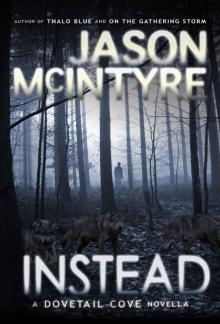 Instead (Dovetail Cove, 1979) (Dovetail Cove Series)
Instead (Dovetail Cove, 1979) (Dovetail Cove Series)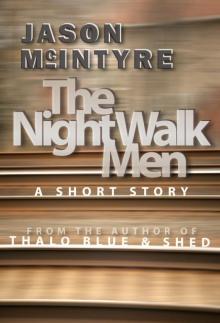 The Night Walk Men
The Night Walk Men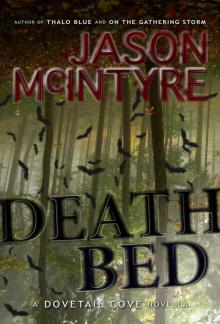 Deathbed (Dovetail Cove, 1971) (Dovetail Cove Series)
Deathbed (Dovetail Cove, 1971) (Dovetail Cove Series)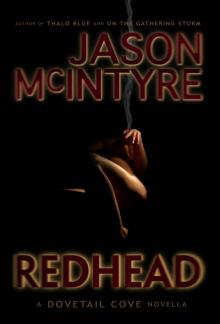 Redhead (Dovetail Cove, 1974) (Dovetail Cove Series)
Redhead (Dovetail Cove, 1974) (Dovetail Cove Series)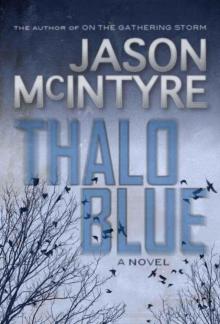 Thalo Blue
Thalo Blue Shed
Shed Shed (Dovetail Cove, 1977) (Dovetail Cove Series)
Shed (Dovetail Cove, 1977) (Dovetail Cove Series)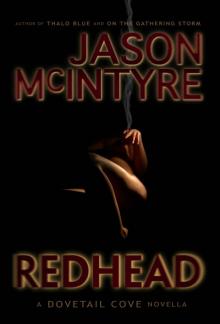 Redhead
Redhead Dread (Dovetail Cove, 1978) (Dovetail Cove Series)
Dread (Dovetail Cove, 1978) (Dovetail Cove Series) Zed (Dovetail Cove, 1975) (Dovetail Cove Series)
Zed (Dovetail Cove, 1975) (Dovetail Cove Series)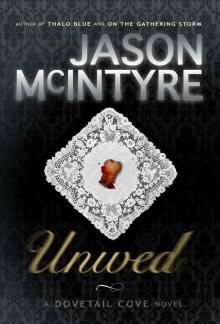 Unwed (Dovetail Cove, 1976) (Dovetail Cove Series)
Unwed (Dovetail Cove, 1976) (Dovetail Cove Series)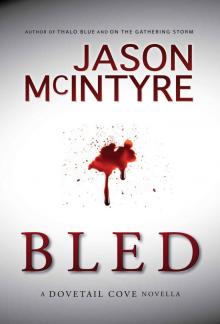 Bled (Dovetail Cove, 1972) (Dovetail Cove Series)
Bled (Dovetail Cove, 1972) (Dovetail Cove Series)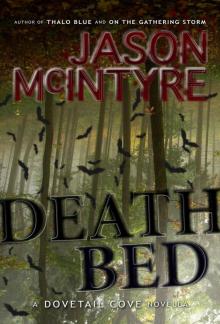 Deathbed
Deathbed